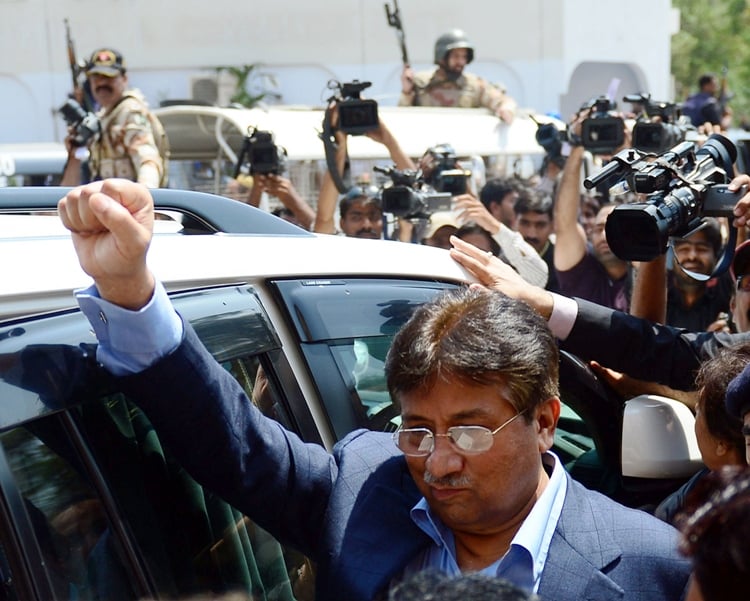
The country’s powerful security establishment had advised former military ruler Gen (retd) Pervez Musharraf not to return to Pakistan, just days before he ended his four-year self-imposed exile.
“No one wanted him (Musharraf) to come back,” an official told The Express Tribune on condition of anonymity. The primary reason that the military opposed his return was threats to his life, the source said, adding that the army also feared that his homecoming could lead to other political controversies.
The source disclosed that there was consensus among all stakeholders – including the civil and military establishment – that Musharraf should not have returned home at this stage.

However, Musharraf defied the military’s advice and went ahead with his plan.
The army’s opposition stemmed from fears that the legal challenges Musharraf is facing may open a Pandora’s box.
The Supreme Court has already taken up a petition seeking Musharraf’s trial on treason charges for imposing emergency rule and arresting top judges in 2007. The case is likely to spark several legal controversies if he opts to defend himself, observed Justice (retd) Tariq Mehmood. “The case may involve people who were then Musharraf’s aides, both in the military as well as in the civilian government,” he observed.
The apex court may issue directions to the federal government to initiate a case of high treason against Musharraf, according to senior lawyer Lt Col (retd) Inam.
The court can conduct his trial because he is a civilian now, he added.
The apex court can refer the matter to army authorities to conduct his trial through Field General Court Marshal – the highest forum to try an accused person in the military, he explained. “Musharraf’s trial can be conducted under Section 59 of the Army Act, 1954,” he went on to add.
If Musharraf, in his defence, includes the names of both civilians as well as the corps commanders, he would have to justify his stance. The court, however, could also summon anyone, whether they served in the military or civil government, he added.
Regarding any legal consent of the then civilian government in imposing the emergency, Tariq Azeem, who served as the deputy information minister in former prime minister Shaukat Aziz’s cabinet, said: “I cannot recall any cabinet meeting in which any decision was taken to impose emergency on November 3, 2007.”
However, legal experts believe it is too early to draw any conclusions at this stage and it is also not clear whether the caretaker government has the power to order such a trial.
Published in The Express Tribune, April 9th, 2013.
COMMENTS (9)
Comments are moderated and generally will be posted if they are on-topic and not abusive.
For more information, please see our Comments FAQ

















I wish Musharraf to come in to Power and lead the Greater Pakistan
@Babloo: That means muk mukka
@Babloo: "What is that ??"
Army has approved.
@Nadir: Do you think Kayani would vacate his post for Musharraf? Do you think Musharraf who was 'a little bit embarrassed' at having to stand up in a court for a judge would be willing to serve under Kayani to whom he had handed over charge?
Love Musharraf in that pose. What a man. Just let him run and let's see what happens... You let the sharif brother run..
we love musharraf salute! pakistan needs him desperately! not vice versa!
Musharraf did not care about the Army then, he does not care about the Army now. End of story.
I read news from around the world. The following phrase I find only in Pakistan media. "consensus among all stakeholders".
What is that ??
Perhaps like the NLC scam generals and the Royal Palm Golf course scam generals, GHQ can reinstate Musharaf in the Army and then claim that court martial proceedings are taking place against him. Like the NLC and Royal Palm Golf course scam generals, 2/3 years will pass and nothing will happen.